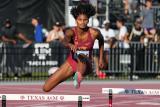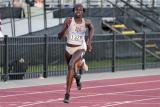Folders |
Preview - 10 Storylines To Follow at the NCAA Division 1 Women's Outdoor Championships 2021Published by
USC seeks satisfying conclusion following shocking 2019 finale, LSU looks to make up for lost opportunity last year and Texas A&M to rely heavily on terrific tandem in pursuit of women’s team title, which Arkansas attempts to defend By Erik Boal, DyeStat Editor The 39th edition of the NCAA Women’s Division 1 Outdoor Track and Field Championships are scheduled for Thursday and Saturday at Hayward Field in Eugene, Ore., with the heptathlon going Friday and Saturday. It marks the first time the event will be held in Oregon since 2018 and the 13th overall to decide the women’s individual, relay and team titles. USC leads all women’s teams with 20 entries, followed by LSU at 19, Arkansas with 17 and Texas A&M with 14. Alabama and Texas both have 12 entries, with North Carolina A&T accumulating 11. Georgia also has 11 – despite Anna Hall not competing in the heptathlon to focus instead on the upcoming Olympic Trials – in addition to Kentucky featuring 11, although reigning indoor 200-meter champion and co-collegiate record holder Abby Steiner was unable to advance out of the East Regionals as a result of an injury. BYU, Kansas State and host Oregon all boast 10 entries. Five individual champions from 2019 return, including a pair from USC in Anna Cockrell in the 400-meter hurdles and Angie Annelus seeking a third title in the 200 meters. Camryn Rogers of Cal is prepared to defend her title in the hammer throw, along with Laulauga Tausaga from Iowa in the discus. Although Samantha Noennig has transferred from Arizona State to Arizona, she will have an opportunity to secure another shot put crown. Both the USC 4x100-meter relay and Texas A&M 4x400 relay also feature returning athletes from their championship lineups two years ago, with Arkansas having only one scoring competitor, Paris Peoples, back from the group that secured the team title in Austin, Texas. Here are 10 storylines to follow in the women’s meet: Two team races to be decided As All-American high jumper Abigail O’Donoghue shared in a recent social media post, it’s “LSU vs. The World” this week in Oregon, as several programs, most notably USC, Texas A&M, Georgia and Arkansas in the women’s competition, will try to prevent a potential Tigers’ sweep of both team championships. But LSU and every other challenger will also try to stand in the way of the redemption run for USC’s Anna Cockrell, who has been waiting two years to not only defend her 400-meter hurdles title, but also to help the program return to the top of the podium following a heartbreaking conclusion in 2019 in Austin, Texas. Then, there is the race for the Terry Crawford Women’s Division 1 Program of the Year, which will be highlighted by the respective team finishes of indoor champion Arkansas and cross country winner Brigham Young. Arkansas, also the reigning 2019 outdoor champion, and BYU are both in contention for podium finishes, but the leading challengers for the women’s team title are LSU, USC and Texas A&M, with many others looking to play the role of spoiler. USC won the 2018 women’s title at Hayward Field, before the stadium was demolished and renovated to host this year’s Division 1 Championships and Olympic Trials, in addition to the 2022 World Championships. It appeared USC was on its way to a repeat in 2019 in Austin, until a dropped baton on the 4x400-meter relay opened the door for Arkansas to build toward a triple crown by winning cross country, indoor track and field, along with outdoor track and field titles in the same year. The Razorbacks also won a women’s team title at Hayward Field in 2016. LSU won a women’s championship on the field in 2012, but the title was later forced to be vacated because sprinter Semoy Hackett was disqualified for testing positive for banned stimulant Methylhexaneamine during competition. As a result, the Tigers are pursuing their first official women’s team crown since 2008 and their record 15th overall. LSU has previously won three times at Hayward Field, capturing titles in 1988, 1991 and 1996. Texas A&M is seeking its first women’s title since 2014 and a fifth overall, which would move the Aggies into second place all-time, trailing only LSU. Neither Arkansas or BYU has ever achieved the Terry Crawford award recognition, with the Razorbacks finishing runner-up twice to Oregon during the 2014-15 and 2015-16 school years. BYU has never placed in the top three during the competition, as Oregon and Stanford are the only previous award winners. Davis looking to soar to 7-meter heaven There hasn’t been a 7-meter performance in the women’s long jump at Hayward Field since 2017. There has never been a 7-meter effort achieved under any conditions at the Division 1 championship meet. So there is plenty of motivation for Texas standout Tara Davis, the collegiate indoor and outdoor long jump record holder, to add those accolades to her impressive list of achievements this year. Davis, the reigning NCAA indoor champion March 12 at Randal Tyson Track Center in Fayetteville, Ark., soared to 23-5.25 (7.14m) on March 25 at the Clyde Littlefield Texas Relays in Austin. The mark ranks No. 2 in the world this year, trailing only Nigeria’s Ese Brume and her 23-6.25 (7.17m) effort May 29 at the Chula Vista Elite Athlete Training Center in California. Brittney Reese, the 2012 Olympic gold medalist along with the last female athlete to surpass the 7-meter mark at Hayward Field four years ago, also shares the all-time facility record with fellow American Marion Jones at 23-11.75 (7.31m), a mark Reese achieved at the 2016 Olympic Trials. The championship meet record of 22-9.25 (6.94m) achieved by LSU’s Sheila Echols has stood since 1987. Texas has never captured a women’s outdoor long jump title in program history, with Davis – who placed fifth as a freshman representing Georgia in 2018 – also attempting to become the first female athlete to sweep the indoor and outdoor championships since Texas Christian’s Whitney Gipson in 2012. Texas A&M has Tyra Gittens and Deborah Acquah, Texas Tech boasts Ruth Usoro, host Oregon highlights Alysah Hickey and Rhesa Foster, with Georgia showcasing Jasmine Moore and Florida featuring indoor runner-up Claire Bryant in an effort to deny Davis her first career outdoor championship. With such impressive depth in the field, it could mark the first time in the history of the outdoor final that four or more female athletes could surpass the 22-foot barrier. The last time three competitors jumped at least 22 feet in the final was 2015. Aggies aiming for multiple collegiate records Texas A&M freshman Athing Mu already has five collegiate records and will be aiming for a sixth all-time performance in the 4x400-meter relay. Tyra Gittens could add heptathlon history to her pentathlon prowess. And the Aggies will be relying heavily on their performances, along with a strong supporting group of sprinters, hurdlers and jumpers in order to remain in championship contention. Mu achieved the collegiate 400 record May 29 on her home track at E.B. Cushing Stadium in College Station at the Division 1 West Regional, clocking 49.68 seconds to surpass the 2016 mark of 49.71 achieved by Texas’ Courtney Okolo. Clora Williams (2006) and Jessica Beard (2011) are the only Texas A&M female athletes to win 400 national outdoor titles. Former Georgia standout Lynna Irby, who ran 49.80 to win the 2018 title, is the only female competitor to produce a sub-50 performance at the Division 1 outdoor final. Two-time indoor 400 national champion Kaelin Roberts of USC, who prevailed against Mu in March, also has the potential to run under 50 seconds. Mu will not only try to help Texas A&M defend its 4x400 championship from 2019, but also take aim at the championship meet, facility and collegiate records of 3:23.13 established by Oregon at the 2017 final. Texas A&M is the No. 6 all-time program with its 2019 performance of 3:25.57, with Oregon, USC and Texas the only three schools to run sub-3:24 in collegiate history. Gittens, who elevated to No. 3 in collegiate history in the heptathlon by scoring 6,418 points May 13-14 at the SEC Outdoor Championships in College Station, has the potential to challenge the record of 6,527 points held by George Mason’s Diane Guthrie-Gresham that has stood since 1995. Gittens produced the collegiate record in the indoor pentathlon with 4,746 points March 11-12 at the Division 1 Indoor Championships in Arkansas. She also won the high jump and finished third in the long jump to score 26 points for the Aggies. Texas A&M will need similar production from Gittens and Mu to keep pace with LSU and USC. The Aggies have never crowned a women’s heptathlon winner in program history, with Gittens looking to follow former Georgia standout Kendell Williams in 2017 in sweeping pentathlon and heptathlon titles in the same year. Michelle Atherley of Miami (Florida), the 2019 indoor pentathlon winner, is the only other athlete in the field to score more than 6,000 points, which she has achieved three times in her career. Atherley was second and Gittens took third at the 2019 outdoor final in Austin, trailing Texas’ Ashtin Zamzow-Mahler. Tigers hoping Marshall Law reigns supreme LSU has more winners in the women’s 100-meter hurdles than any team in Division 1 history, with Tonea Marshall not only looking to add her name to the elite group Saturday, but also take aim at the collegiate record. The Tigers haven’t crowned a 100 hurdles champion since Joyce Bates in 2000, but produced five champions in a 12-year span, with Tananjalyn Staley (1989), Dawn Bowles (1991), Kim Carson (1996) and Astia Walker (1997) joining Bates. Marshall finished third at the 2019 final, but has been the class of collegiate competition all year, elevating to the No. 4 all-time performer with her wind-legal 12.44 performance May 29 at the Division 1 East Regional in Jacksonville, Fla. Brianna McNeal of Clemson set the championship meet and collegiate records in 2013, clocking 12.39. Former Kentucky standout Keni Harrison produced the facility record of 12.24 in 2016. With 2019 runner-up Chanel Brissett, now competing for Texas, not advancing following a false start at the West Regional in College Station, Marshall has run nearly two-tenths of a second faster than anyone in the field. Marshall will also play a significant role for LSU in the 4x100 relay, as the Tigers are attempting to challenge the meet and facility records of 42.09 they achieved in the 2018 semifinals, or the collegiate record of 42.05 they ran earlier that same year. Steeplechase becomes showcase event In the 2018 final at Hayward Field, 10 athletes eclipsed the 10-minute mark in the 3,000 steeplechase for the first time in championship history, with the top eight finishers and All-America first-team honorees all running under 9:50.00. Both those marks could be challenged in Saturday’s final, with 12 qualifiers already having run under 9:50 this season. In addition, it could also be the first time that at least five athletes run under 9:40 in the same championship race, with only the top four producing that depth in 2015. Brigham Young star Courtney Wayment is looking to achieve the exceptional double of the indoor 3,000 and outdoor 3,000 steeplechase championships in the same year, a feat last achieved in 2009 by Jenny (Barringer) Simpson of Colorado. Canadian Charlotte Prouse of New Mexico, a two-time national runner-up, is trying to produce the Lobos’ first title since Courtney Frerichs in 2016. Joyce Kimeli of Auburn, a Kenyan standout and the indoor 5,000 winner, is also a legitimate contender, along with Hannah Steelman of North Carolina State, who took third in 2019 representing Wofford. Gabrielle Jennings of Furman, ninth in 2019, is also returning in search of an individual championship, with Polish athlete Aneta Konieczek of Oregon, Air Force’s Mahala Norris, Weber State’s Summer Allen and Washington’s Katie Rainsberger all contributing to the potential deepest steeplechase final in collegiate history. Returning to life in the fast lane Following two of the most thrilling sprint finals in Division 1 history in 2019 in Austin, with Sha’Carri Richardson of LSU producing the collegiate record by clocking 10.75 seconds in the 100-meter dash, only to have her pursuit of a championship sweep denied in the 200 final by two-time champion Angie Annelus of USC by a 22.16 to 22.17 margin, there could be more fireworks in store Saturday in both events. Annelus has qualified again, looking to become only the second three-time champion in event history, joining Kimberlyn Duncan of LSU from 2011-13. But she isn’t even the fastest entry from her own team. That distinction goes to Twanisha “Tee Tee” Terry, who also returns for USC, along with Cambrea Sturgis for North Carolina A&T, third-place finishers from 2019 in the 100 and 200 finals, respectively. Then there are rising stars Tamara Clark of Alabama, who achieved the fastest all-conditions 200 performance in collegiate history May 15 by clocking a wind-aided 21.89 at the SEC Championships in College Station, along with Jamaican competitor Kemba Nelson of Oregon, Nigerian standout Favour Ofili of LSU and Anavia Battle of Ohio State. Terry elevated to the No. 4 all-time collegiate competitor May 29 in the 100 with her wind-legal 10.89 at the West Regional, the same day that Sturgis ascended to No. 5 at 10.92 at the East Regional. Clark ran a wind-legal 10.96 on April 23 at LSU to improve to the No. 9 all-time competitor and Nelson, the reigning indoor 60-meter champion, produced a wind-legal 10.98 performance at the West Regionals. The 2019 final is regarded as the deepest in collegiate 100-meter history, with seven competitors running under 11.15, including Annelus placing seventh in 11.12. But there has never been a 100 championship race with four competitors running sub-11, as former Texas standout Teahna Daniels finished fourth two years ago in 11.00. Symone Mason is the only hope for LSU in the 100 to extend the Tigers’ dominance to four consecutive champions, following Mikiah Brisco, Aleia Hobbs and Richardson from 2017-19. Ariana (Washington) Murphy is the last Oregon athlete to win the 100 in 2016, in addition to being the most recent collegiate sprinter to sweep both titles. Remona Burchell of Jamaica is the last Alabama competitor to capture the 100 crown in 2014 and USC’s last championship came when Angela Williams won four in a row in the event from 1999-2002. Clark ran 22.13 in the 200 at the East Regional to elevate to the No. 4 all-time competitor and, along with Annelus, has her sights set on the collegiate record of 22.02 produced in the 2017 final by Florida’s Kyra Jefferson. Annelus is No. 5 in collegiate history with her 2019 championship performance, with Sturgis at No. 15 in 22.26, Battle at No. 17 in 22.28 and Ofili at No. 21 at 22.30. Throws ready to put on quite a show No matter the women’s throwing event Thursday or Saturday, expect collegiate records to be challenged and the opportunities for multiple athletes to earn a second career national championship. Perhaps no thrower in either gender has generated more buzz in recent weeks than Dutch standout Jorinde van Klinken of Arizona State, who produced the best performance ever by a collegiate female athlete in the discus throw May 22 with her 230-4 (70.22m) effort competing unattached at the USATF Throws Festival in Tucson. That mark came following a 216-4 (65.94m) performance May 20 at the Tucson Elite Classic. She currently ranks as the No. 7 competitor in collegiate history with her 211-5 (64.44m) effort May 29 at the West Regionals in College Station, a mark that is also superior to the personal-best 209-9 (63.94m) achieved by reigning Division 1 champion Laulauga Tausaga of Iowa. Arizona State has produced four female discus champions in program history, most recently Maggie Ewen in 2018. The official collegiate discus record remains 221-5 (67.48m) by Meg Ritchie of Arizona, a standard that has stood since 1981, but could be erased Saturday in the final. The last repeat winner in the discus was Shelbi Vaughan of Texas A&M in 2014-15. Camryn Rogers of Cal, representing Canada, not only has the opportunity to become the first repeat champion in the hammer throw since current American record holder DeAnna Price won back-to-back titles at Southern Illinois in 2015-16, but also the potential to surpass the collegiate all-time performance. Rogers elevated April 17 to the No. 3 competitor in Division 1 history at the West Coast Classic at Hayward Field by throwing 239-10 (73.09m). Ewen set the collegiate record of 244-6 (74.53m) in 2018. No Cal female athlete has repeated as champion in any event since Sheila Hudson secured consecutive triple jump crowns in 1987-88. Arizona State’s Beatrice Llano, UCLA’s Alyssa Wilson and South Alabama’s Autavia Fluker are the only other competitors in the field who have surpassed the 70-meter mark in their careers. Llano, a Norwegian athlete, ranks No. 8 all-time at 234-4 (71.43m) and Wilson is No. 11 in collegiate history at 231-9 (70.63m). The women’s shot put features the best depth in the event since 2017, when eight athletes surpassed the 17-meter mark. Of the 24 qualifiers, 19 have achieved a 17-meter performance during their careers. Adelaide Aquilla of Ohio State, the reigning indoor shot put champion, leads a trio of Buckeyes into the championship, with Sade Olatoye and Divine Oladipo also competing. Ohio State is trying to match the success of Washington (1988), UCLA (1991 and 1993) and South Carolina (1997) by having all three athletes earning All-America first-team honors. In addition to securing the first outdoor shot put crown for the Buckeyes, Aquilla is looking to follow Arizona State’s Ewen (2018) and Samantha Noennig (2019) – now competing for Arizona – by sweeping the indoor and outdoor shot put titles in the same year. She could also challenge the collegiate record of 63-10.25 (19.46m) achieved in 2018 by Ewen following her 62-8.75 (19.12m) performance May 14 at the Big Ten Championships that helped Aquilla ascend to the No. 4 all-time Division 1 competitor. Khayla Dawson of Indiana is ranked No. 7 in collegiate history at 62-0.50 (18.91m) and Latavia Maines of Tennessee is 12th all-time at 61-4.75 (18.71m). Noennig, the defending outdoor champion, is looking to match the success of Raven Saunders by winning crowns for multiple schools. Saunders achieved the feat for Southern Illinois in 2015 and Ole Miss in 2016. The collegiate javelin record could also be tested Thursday, with Georgia’s Marie-Therese Obst and Auburn’s Kylee Carter both capable of launching an all-time throw. Obst ranks No. 4 in collegiate history at 201-4 (61.37m), looking to become the first javelin champion for the Bulldogs since Freya Jones in 2013. Carter is No. 8 all-time at 199-2 (60.69m) and is seeking Auburn’s first title in the event. Aquilla, Dawson, Oladipo, Tausaga and van Klinken are among the eight athletes who qualified in both the discus and shot put, with Olatoye the only athlete to advance in the hammer and shot put. North Dakota State’s Akealy Moton qualified in the shot put and javelin, with Florida State having multiple qualifiers in the discus with Shanice Love of Jamaica and Caisa-Marie Lindfors of Sweden, as well as the javelin with Kelechi Nwanaga from Nigeria and Sara Zabarino of Italy. Although she isn’t considered a championship contender in any of the events, Jalani Davis of Ole Miss is the only athlete in either gender to qualify in the discus, hammer and shot put. Double play for Chelangat could produce triple crown Alabama’s Mercy Chelangat has an opportunity to achieve a feat not seen in collegiate women’s distance running in nearly 25 years, and she could do so in unprecedented fashion. Chelangat, who won the Division 1 women’s cross country individual title March 15, is looking to add championships in the 5,000 and 10,000 meters, as she is one of five athletes scheduled to take on the distance double, joining Haley Herberg of Washington, Abby Nichols of Colorado, Clare O’Brien of Boise State and British athlete Poppy Tank of Utah. Chelangat, representing Kenya, is looking to become the first female competitor since South African Dominique Scott of Arkansas in 2016 to win both the outdoor 5,000 and 10,000 championships in the same year. If Chelangat can secure both titles, she would become the first female athlete since Amy (Skieresz) Wilson of Arizona during the 1996-97 school year to win the individual cross country crown and then capture 5,000 and 10,000 championships on the track. Most impressive would be the fact that Chelangat would accomplish that trifecta in less than three months. Alabama has not won a women’s title in either the 5,000 or 10,000 in program history. Carmela Cardama Baez of Oregon, representing Spain, is the 2019 runner-up in the 10,000 and Grace Forbes of Rice is the top American in the field, having qualified for the Olympic Trials. Amanda Vestri of Syracuse, who competed for Iowa State in the 2019 final, qualified as well. Auburn’s Joyce Kimeli, the indoor 5,000 champion, is entered in the 3,000 steeplechase and the 5,000. Whittni Orton-Morgan, a member of BYU’s national championship cross country lineup, is one of three female competitors entered in the 1,500 and 5,000, along with Stanford teammates Ella Donaghu and Julia Heymach. Sheila Reid of Villanova is the only women’s competitor in Division 1 history to win the 1,500 and 5,000 in the same year. Tough act to follow in triple jump Following the deepest women’s indoor triple jump competition in collegiate history at the Division 1 final in March, with the top six competitors all jumping over 44 feet and three 14-meter athletes for the first time at the meet, all of the leading contenders return for Saturday’s outdoor championship looking to produce another memorable event. Texas Tech’s Ruth Usoro, the No. 2 all-time indoor and outdoor competitor in Division 1 history representing Nigeria, will look to follow collegiate record-holder Keturah Orji of Georgia by sweeping both indoor and outdoor titles. Orji achieved the feat for three straight years from 2016-18. Usoro tied Texas A&M’s Deborah Acquah, competing for Ghana, at the indoor final with a best jump of 46-10 (14.27m), resulting in the strongest second performance being used to determine the winner. Usoro had also jumped 46-7.50 (14.21m) to capture the championship. Neither Texas Tech or Texas A&M has ever had a female athlete win the outdoor triple jump title. Usoro has jumped 47-7 (14.50m) outdoors, with Acquah at No. 11 all-time at 46-4.25 (14.13m). American Jasmine Moore, competing for Georgia, is No. 3 in collegiate history at 47-2.50 (14.39m) and she finished fourth at the indoor final. Florida State’s Ruta Lasmane, representing Latvia, took third at the indoor championship and ranks as the No. 7 collegiate outdoor competitor at 46-7.25 (14.20m), with Florida’s Natricia Hooper – an elite athlete from Guyana – the No. 23 all-time outdoor performer at 45-8 (13.92m) after placing sixth indoors. Washington State’s Charisma Taylor, who placed fifth indoors representing the Bahamas, boasts a personal-best 44-8.75 (13.63m). The 2008 final was the only championship with multiple 14-meter competitors. The last time seven athletes surpassed 44 feet in the same Division 1 outdoor meet was 2004. Miller, Hurta seeking more middle-distance memories Aaliyah Miller of Baylor won the 800-meter title at the Division 1 Indoor final in March, with Sage Hurta of Colorado capturing the mile crown. Now, they both have an opportunity to secure impressive championship sweeps, with Hurta pursuing the 1,500-meter title, trying to accomplish a double last achieved in 2010 by British athlete Charlotte Browning competing for Florida. Miller is looking to follow Oregon all-time great Raevyn Rogers, the last female athlete to win 800 championships indoors and outdoors in both 2016 and 2017. Baylor has never won the outdoor 800 crown, with Miller needing to navigate through an incredibly strong field that features half of the 24 qualifiers having run under 2:02.00. Virginia’s Michaela Meyer ranks No. 9 in collegiate outdoor history at 2:00.40 and Clemson’s Laurie Barton is No. 16 at 2:00.70, with Miller equal to No. 20 all-time at 2:00.87. The last time all eight finalists ran sub-2:03 in the championship race was 2013, depth that should be challenged, especially with Sarah Hendrick of Kennesaw State, Amber Tanner of Georgia, Aurora Rynda of Michigan, Katy-Ann McDonald of LSU, Lindsey Butler of Virginia Tech, Kayla Johnson of Miami (Florida), McKenna Keegan of Villanova and Gabrielle Wilkinson of Florida all capable of advancing to the final, in addition to 2019 All-Americans Avi'Tal Wilson-Perteete of UNLV, Kristie Schoffield of Boise State and Anna Camp-Bennett of BYU. Hurta, who ranks No. 12 among collegiate 800 competitors at 2:00.62, has decided to focus her title pursuit on the 1,500, where she is No. 11 all-time at 4:08.38, a performance produced April 23 at Hayward Field at the Oregon Relays. She also faces an exceptional field of contenders, with Arkansas’ Krissy Gear ranking No. 14 in collegiate history at 4:09.00 from the West Coast Relays on April 30, along with BYU’s Whittni Orton-Morgan at No. 17 with her 4:09.31 effort in the same race. Orton-Morgan and Ella Donaghu of Stanford are the only returning 1,500 All-Americans from two years ago. Amaris Tyynismaa of Alabama, who placed third March 15 at the Division 1 cross country final, also advanced in the 1,500 and boasts a personal-best 4:09.48. No women’s 1,500 championship race in history has ever showcased five athletes under 4:10.00, with Stanford’s Christina Aragon having run 4:09.59 and Cardinal teammate Julia Heymach with a personal-best 4:09.89, in addition to Florida State’s Maudie Skyring having clocked 4:09.99. Camp-Bennett is the only athlete entered in both the 800 and 1,500. More news |

















